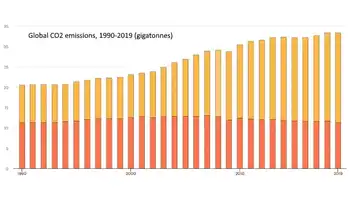Canada, U.S. increasingly at odds over pollution issues
The twin plants, which sit within sight of the Canadian shore about 20 miles south of Port Huron, are churning up legal heat over mercury emissions, too - one of several battles brewing over how American energy companies affect the health of Canadians, and vice versa.
After decades of relative cooperation between the nations on either side of the river, border battles over environmental issues are becoming increasingly contentious. DTE officials will appear in a Canadian court July 7 to answer charges concerning how its plants' mercury emissions have affected Canada's waters and soils downstream.
Other looming issues include:
• Shell Canada's plans for a heavy-oil refinery near Sarnia that could produce 150,000 to 200,000 barrels per day of gasoline, diesel and jet fuel.
• A proposed deep geological repository for nuclear waste in the Ontario municipality of Kincardine - about a mile from the shore of Lake Huron.
• The proposed new bridge crossing over the Detroit River - the construction of which, regardless of its location, is likely to have major environmental impact.
DTE's court date next month will be a rare sight - an American company being tried in Canada - but one that may become more common as both nations move away from traditional bilateral negotiation that was once hailed as a model for the rest of the world.
Some legal experts trace these changes to the Bush White House and what they see as the government's go-it-alone approach to dealing with the environment. And there are varying ideas about whether the trend is a good thing.
"The Bush administration has been less interested in solving trans-boundary issues through diplomacy and bilateral cooperation than previous administrations," said Noah Hall, an international law expert at Wayne State University. "They haven't taken the diplomatic bilateral approach, and people have been left with no other option than to go to court."
Previously, disputes have been resolved through groups like the International Joint Commission or the Center for Environmental Cooperation, which was established as part of the North American Free Trade Agreement.
"Courts are fairly limited in what they are able to do," said Marcia Valiante, a professor of environmental law at the University of Windsor. "They play a certain role and have certain remedies they can offer. But not all are going to be at the table to offer their point of view.
"When you negotiate and work out a resolution, there is more balance in terms of meeting everyone's interests."
One resident near the DTE plants is concerned about the new Shell refinery.
John Breslin's home in East China Township puts him 12 steps away from the St. Clair River, not too far from the DTE plants and right across the water from where Shell wants to build its new refinery. The view - which allows him to see all the way downriver to Marine City - is what sold him on the place a few years ago, but there have been some drawbacks.
"We have the worst water in the world around here," said the 78-year-old retiree from the food service industry. "I won't eat fish out of the river. And I won't drink water out of the tap, even though I have a filter."
Breslin said his concerns over the water lead him to believe that court intervention could be a good thing. But he is pessimistic about how successful challenges can be against large corporations.
"Big money controls everything," he said. "Whatever big money wants is usually what happens."
For Scott Edwards, the courts in Canada were almost a last resort. As legal director for the New York-based Waterkeeper Alliance, he has been searching for a means to combat mercury emissions for years and their main source of pollution: coal-fired power plants.
"We started by looking at the Clean Water Act and the Clean Air Act in the United States and the rules coming out of Washington several years back," said Edwards, who is a Canadian citizen. "Everywhere we looked, we found loopholes, weaknesses or a lack of will to control emissions. Everywhere we looked, industry was getting away with the same things they always have."
Under the Bush administration, he said, there has been little to no legislative crackdown on emissions of mercury, which can affect cardiovascular and neurological activities in humans, typically through consumption of contaminated fish.
In the area of the St. Clair River, Edwards saw an opportunity to use Canadian law - particularly the Canadian Fisheries Act - to limit mercury emissions at DTE's U.S. plants in China and East China townships.
In the coming weeks, DTE officials will appear in Canadian court to enter a plea to the charges, but all along the company has maintained it is doing what the law requires.
"We're currently spending $1 billion to reduce mercury and other emissions from our operations," said Scott Simons, a DTE spokesman. "We're in compliance with state regulations."
DTE's court case is only the latest to be fought over country lines. Several other controversies have been looming along the border in the last few years.
An environmental impact statement submitted by Shell Canada to the U.S. Environmental Protection Agency earlier this year contained glaring omissions, according to environmental officials. Among those are the failure to address the facility's downstream impact on the St. Clair River and to adequately consider potential increases in the amount of mercury and phosphorus that reach it.
And the proposal to bury low-to-intermediate-level nuclear waste in Kincardine, Ontario, has resulted in several Michigan municipalities, including Macomb County, drawing up resolutions opposing the project over fears of leakage contaminating Lake Huron.
"If this was proposed in Michigan, it would not be allowed right on the banks of the lakes," said Doug Martz, who chairs Macomb County's Water Quality Board. "I'm just worried that 35 to 40 million people's drinking water might be contaminated if there is some kind of leak."
Such international disputes aren't just limited to Michigan.
A water diversion project proposed in North Dakota has been stopped in its tracks after the province of Manitoba challenged it in U.S. District Court.
Canadian government officials argued that the project, proposed by the U.S. Bureau of Reclamation, violated terms of the National Environmental Policy Act and would lead to invasive species making their way into Canadian waters - specifically Lake Winnipeg and the Hudson Bay.
The state of Washington went over the border to target Canadian smelting company Teck Cominco Metals Ltd. for slag previously dumped into the Columbia River several miles upstream from the border. In addition, the zinc and lead refining plant is a large discharger of mercury.
In January, the U.S. Supreme Court denied the company's appeal of a lower court ruling that said it was responsible for cleaning up the river.
Both cases demonstrated the willingness of courts to uphold each nation's laws in the other country. And as a result, Hall said it is likely that many major projects located in or affecting Michigan - such as the Shell refinery, Kincardine nuclear repository and new bridge - could be contested in court.
"Absolutely, they could," he said.
Related News

GM president: Electric cars won't go mainstream until we fix these problems
DETROIT - The automotive industry is hurtling toward a future that will change transportation the same way electricity changed how we light the world. Electric and self-driving vehicles will alter the automotive landscape forever — it's only a question of how soon.
Like any revolution, this one will be created by market demand.
Beyond the environmental benefit, electric vehicle owners enjoy the performance, quiet operation, robust acceleration, style and interior space. And EV owners like not having to buy gasoline. We believe the majority of these customers will stay loyal to electric cars.
But what about non-EV owners? Will they want to…





